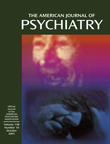Cost-Effectiveness of a Collaborative Care Program for Primary Care Patients With Persistent Depression
Abstract
OBJECTIVE: The authors evaluated the incremental cost-effectiveness of stepped collaborative care for patients with persistent depressive symptoms after usual primary care management. METHOD: Primary care patients initiating antidepressant treatment completed a standardized telephone assessment 6–8 weeks after the initial prescription. Those with persistent major depression or significant subthreshold depressive symptoms were randomly assigned to continued usual care or collaborative care. The collaborative care included systematic patient education, an initial visit with a consulting psychiatrist, 2–4 months of shared care by the psychiatrist and primary care physician, and monitoring of follow-up visits and adherence to medication regimen. Clinical outcomes were assessed through blinded telephone assessments at 1, 3, and 6 months. Health services utilization and costs were assessed through health plan claims and accounting data. RESULTS: Patients receiving collaborative care experienced a mean of 16.7 additional depression-free days over 6 months. The mean incremental cost of depression treatment in this program was $357. The additional cost was attributable to greater expenditures for antidepressant prescriptions and outpatient visits. No offsetting decrease in use of other health services was observed. The incremental cost-effectiveness was $21.44 per depression-free day. CONCLUSIONS: A stepped collaborative care program for depressed primary care patients led to substantial increases in treatment effectiveness and moderate increases in costs. These findings are consistent with those of other randomized trials. Improving outcomes of depression treatment in primary care requires investment of additional resources, but the return on this investment is comparable to that of many other widely accepted medical interventions.



